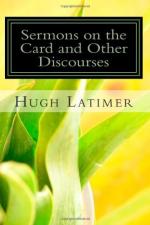as thy body can well suffer, and offer as great candles
as oaks; if thou leave the works of mercy and the
commandments undone, these works shall nothing avail
thee. No doubt the voluntary works be good and
ought to be done; but yet they must be so done, that
by their occasion the necessary works and the works
of mercy be not decayed and forgotten. If you
will build a glorious church unto God, see first yourself
to be in charity with your neighbours, and suffer
not them to be offended by your works. Then,
when ye come into your parish-church; you bring with
you the holy temple of God; as St. Paul saith, “You
yourselves be the very holy temples of God:”
and Christ saith by his prophet, “In you will
I rest, and intend to make my mansion and abiding-place.”
Again, if you list to gild and paint Christ in your
churches, and honour him in vestments, see that before
your eyes the poor people die not for lack of meat,
drink, and clothing. Then do you deck the very
true temple of God, and honour him in rich vestures
that will never be worn, and so forth use yourselves
according unto the commandments: and then, finally,
set up your candles, and they will report what a glorious
light remaineth in your hearts; for it is not fitting
to see a dead man light candles. Then, I say,
go your pilgrimages, build your material churches,
do all your voluntary works; and they will then represent
you unto God, and testify with you, that you have
provided him a glorious place in your hearts.
But beware, I say again, that you do not run so far
in your voluntary works, that ye do quite forget your
necessary works of mercy, which you are bound to keep:
you must have ever a good respect unto the best and
worthiest works toward God to be done first and with
more efficacy, and the other to be done secondarily.
Thus if you do, with the other that I have spoken
of before, ye may come according to the tenor of your
cards, and offer your oblations and prayers to our
Lord Jesus Christ, who will both hear and accept them
to your everlasting joy and glory: to the which
he bring us, and all those whom he suffered death
for. Amen.
A sermon made by M. Hugh Latimer, at the time of the insurrection in the North, which was in the twenty-seventh year of the reign of king Henry the eighth, Ann. Dom. 1535. Upon the epistle read in the church the twenty-first Sunday after Trinity Sunday, taken out of the sixth chapter of the epistle of st. Paul to the Ephesians.
Put on all the armour of God,
that ye may stand, &c. [Ephes. vi.
10, et seq.]




